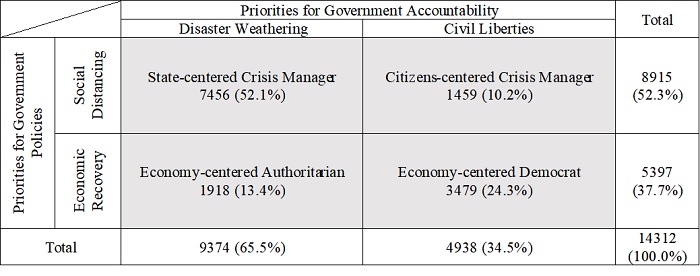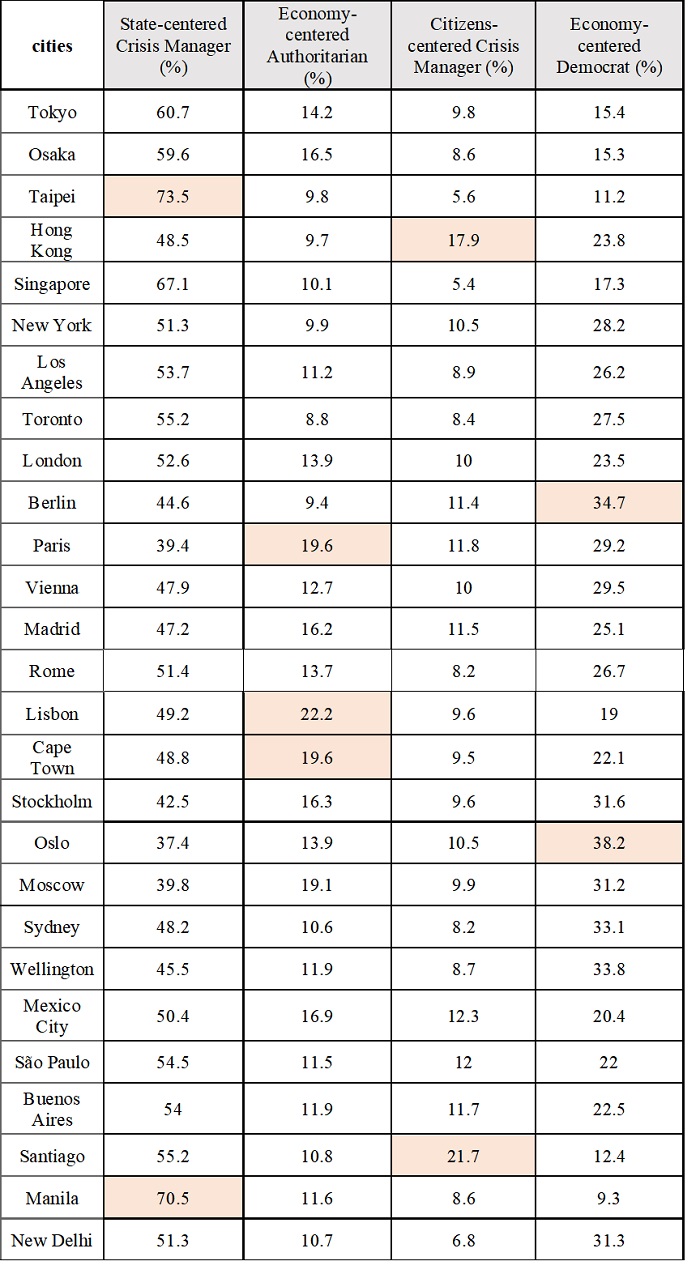Categorization of Global Citizens by Individual Values
1.
Background
In
COVID-19 data analysis 4 series, we have observed whether global citizens
prefer conservative values or liberal ideas amid COVID-19 pandemic. Also, in
data analysis 4.8 we concluded that people who have high requirements on
citizens’ requests generally prioritize liberal values, such as civil
liberties, economic recovery, rule of law, citizen-centered quarantine,
cooperation, and data privacy, which indicates that there is a positive relationship
between respect for civil society and different liberal ideas. However, this
general trend cannot be applicable for every single individual, for
instance, a person could hold liberal and conservative values simultaneously,
which means that a citizen can emphasize both on disaster weathering and
economic recovery, or stress on civil liberties and social distancing at the
same time. Accordingly, we will categorize global citizens by their different
individual values and scrutinize how the world is made up of different types of
people.
2.
Research
Topic
In the middle of the COVID-19 pandemic, it
is of importance to balance the public health and private rights, and it is a
government duty to make appropriate health policies to satisfy its people. This
section will analyze how the international society consists of different types
of people according to their individual liberal and conservative beliefs.
3.
Questionnaire
Used
Survey Question II-2-1: “It is the duty of
a democratic state to protect the lives and health of the public and to ensure
the fundamental freedoms of all citizens. In the current situation, what do you
think is the most urgent task set before the government of your country?” The
answers consist of a 10-point scale, with higher scores indicating an
individual who emphasizes more on basic civil rights and lower scores
demonstrating a person who underlines overcoming a disaster to protect public
health.
Survey Question II-2-2: “In the current
situation, what do you think is a more urgent task set before your country
between social distancing for public health and returning to normal life for
economic recovery?” The answers consist of a 10-point scale, with higher scores
indicating an individual who emphasizes more on economic recovery and lower
scores demonstrating a person who underlines public health.
4.
Major
Outcomes
Table 1: Categorization of Citizens
of 28 Global Cities by Liberal and Conservative Values

We used two questions to categorize global
citizens into four parts, including “state-centered crisis manager”, “citizens-centered
crisis manager”, “economy-centered authoritarian”, and “economy-centered
democrat”. State-centered crisis managers constitute the largest portion in
global society during the COVID-19 pandemic, making up of 52.1%. This group of
people are inclined to be conservative emphasizing both on disaster weathering
and social distancing. The second largest group is called economy-centered
democrats who are penchant for liberal ideas, stressing on economic recovery
and civil liberties, making up of 24.3%.
However, there are still two groups of
people who hold contradicting values, such as citizens-centered crisis mangers
and economy-centered authoritarians. According to the “COVID-19 data analysis
4.8” people who put an importance on overcoming the disaster highlight social
distancing policy; yet, the data analysis shows that some people who highly
want to weather the disaster prioritize economic policies than social
distancing amid COVID-19, and we call them economy-centered authoritarian,
making up of 13.4.%. Likewise, citizens-centered crisis mangers insist on civil
liberties, but they underline the policy of social distancing at the same time,
making up of 10.2%.
Table 2: Distribution Table of Categorized
Individual Values by region
The table
indicates the percentage of how many global citizens belong to each type. To
illustrate, East Asia has the largest number of “state-centered crisis mangers”
who are holding conservative ideology, accounting for 61.8%, followed by
South/Southeast Asia, Latin America, North America, Oceania, and Europe. As for
liberal “economy-centered democrats” are largely located in Oceania, accounting
for 33.4%, followed by Europe, North America, South/Southeast Ais, Latin
America, and East Asia. The data demonstrates that East Asia has the largest
portion of conservative type of citizens, and the least percentage of liberal
type of individuals. Meanwhile, Oceania and Europe have the largest number of
liberal citizens and the smallest number of conservative citizens. Besides, “economy-centered
authoritarians” are mainly situated in Europe, and “citizens-centered crisis
mangers” in Latin America.
Figure 1: Bar Graph of Categorized
Individual Values by Region
Figure 1 is the
visualized graph of Table 2, and the blue line, yellow line, orange line, grey line
represents state-centered crisis managers, economy-centered democrats,
economy-centered authoritarians, and citizens-centered crisis mangers,
respectively. There are several conclusions can be drawn by this figure: First,
conservative ideology is dominant and prevailing during the pandemic era, as we
can see in Figure 1. Second, there is the hugest gap between conservatives and
liberals in East Asia, indicating the highest request for overcoming the
disaster and people’s social distancing behavior. Third, the smallest gap
between conservative and liberal ideas is in Oceania, implying that even though
people here highlight overcoming the epidemics, the voice of stressing the
civil rights and economy values is also constituted a large portion. Fourth, the
global trend is that state-centered crisis managers are made up for the largest
parts, followed by economy-centered democrats, then economy-centered
authoritarians, and finally citizen-centered crisis managers, but in Latin
America, citizens-centered crisis managers are little more than
economy-centered authoritarians as an exception.
Table 3: Distribution Table of Categorized
Individual Values by Citizens of 28 Global Cities
 For analyzing the 28 global cities, we listed how a city composes of different
types of people according to their individual values on civil liberties, disaster
weathering, economic recovery, and social distancing. Orange cells in the table
are the first two cities which accounted for the largest proportion of those
categories. To illustrate, Taipei and Manila have the largest proportion of
state-centered risk managers in those cities, which composed of 73.5% and
70.5%. Oslo and Berlin have the largest proportion of economy-entered democrats
in those cities, which composed of 38.2% and 34.7%. Lisbon and Cape Town, Paris
have the largest proportion of economy-centered authoritarians, which composed
of 22.2% and 19.6%. Lastly, Santiago and Hong Kong have the largest proportion
of citizen-centered crisis managers, which composed of 21.7% and 17.9%. For analyzing the 28 global cities, we listed how a city composes of different
types of people according to their individual values on civil liberties, disaster
weathering, economic recovery, and social distancing. Orange cells in the table
are the first two cities which accounted for the largest proportion of those
categories. To illustrate, Taipei and Manila have the largest proportion of
state-centered risk managers in those cities, which composed of 73.5% and
70.5%. Oslo and Berlin have the largest proportion of economy-entered democrats
in those cities, which composed of 38.2% and 34.7%. Lisbon and Cape Town, Paris
have the largest proportion of economy-centered authoritarians, which composed
of 22.2% and 19.6%. Lastly, Santiago and Hong Kong have the largest proportion
of citizen-centered crisis managers, which composed of 21.7% and 17.9%.Figure
2: Bar Graph of Categorized Individual Values by Citizens of 28 Global Cities
Figure 2 is the
visualized bar graph of table 3, and we can observe more specific data compared
to Figure 1. Although the global general trend shows that conservative values
are far outweigh liberal ideas during the pandemic era, citizens in Oslo lays
more stress on liberal values, shown in Figure 2. Also, there are several
cities deviate from the global trend: first, citizens in Osaka, Lisbon, and
Manila have larger numbers of economy-centered authoritarians, who want to
overcome the crisis but putting accent on economic recovery that social
distancing; second, citizens in Hong Kong, New York, Berlin, São Paulo, and
Santiago constitute more of citizens-centered crisis managers, who insist on
social distancing but put more emphasis on civil liberties than disaster
weathering.
5.
Summaries
and Further Tasks
a.
Data
analysis shows how different types of citizens allocated in their cities.
b.
Globally
speaking, conservative values are dominant in international society amid
COVID-19 pandemic. This illuminates that global citizens want to overcome the
crisis as soon as possible by conducting social distancing.
c.
At
the same time, western countries, such as cities in Europe and Oceania, attach
greater importance to liberal values than other parts of the world. Although
they point out the significance of overcoming the epidemics; however, they also
give voice to civil rights and economic values.
d.
There
are two groups of people who have conservative and liberal values
simultaneously. They are “economy-centered authoritarians” stressing on
overcoming the disaster with protecting the economic vitality, along with “citizens-centered
crisis managers” underlining the importance of civil liberties and weathering
the disaster at the same time.
e.
Unlike
other regions, Latin America has a larger number of citizens-centered crisis
managers. Also, Hong Kong has this type of citizens more than other parts of
the world as well.
f.
The
study is limited to descriptive research, and therefore, a more detailed
explanative investigation is required to further understand the global citizens’
consciousness presented above. For instance, why some cities deviate from
general global trend?
|